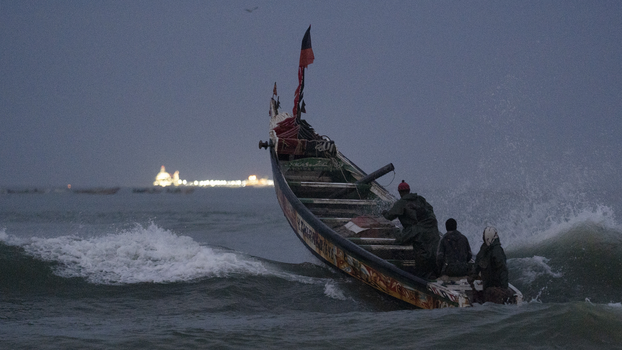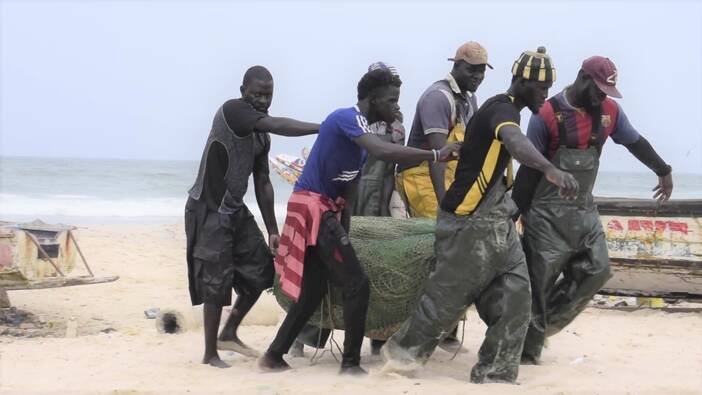
The West African country of Senegal has hosted a thriving fishing industry for countless generations, and indeed, fishing remains a crucial component of Senegalese economy to this day. However, recent discoveries of offshore oil and gas deposits promise to radically transform the Senegalese economy, as foreign investors prepare a number of projects in the country promising wealth, development, and lots of new jobs.
Elimane Haby Kane is a co-founder of the citizen initiative National Mobilization for Civic Engagement, Sovereignty, Unity, and Reformation (MESURE).
This article first appeared in maldekstra #19. Translated by Ryan Eyers and Sonja Hornung for Gegensatz Translation Collective
These projects no doubt pose a genuine economic opportunity for Senegal, a country where the average worker earns around 200 euro per month, but it is not without dangers. The promise of energy sovereignty on the one hand is certainly appealing for many Senegalese, but the construction of large-scale offshore installations could potentially threaten the country’s oldest resource: fishing. Can development and sustainability be reconciled in this case?
Senegalese environmentalist Elimane Haby Kane spoke with Ibrahima Thiam from the Rosa Luxemburg Foundation about Senegal’s new economic opportunities and the possible dangers they may pose.
Senegal stands at the brink of a new era of offshore oil and gas extraction along its coastline. Do you believe this represents a genuine economic opportunity?
In 2014, it was announced that significant oil and gas deposits may exist off the coast of Senegal. After this was confirmed in 2016 and 2017, the Senegalese government signed off on two definitive investment projects: the Sangomar Project for the production of oil, and the production of gas as part of the Greater Tortue Ahmeyim (GTA) Project. A third project, the Yaakar-Teranga Project, is still awaiting approval for investment.
Although the projected quantities of oil and gas do not compare to those of other African oil- and gas-producing countries such as Nigeria, Angola, and Equatorial Guinea, they are certainly significant for a country with a middle-income economy such as Senegal, which has previously been heavily dependent on imported hydrocarbons to meet its energy needs.
The oil and gas production projects could indeed represent an economic opportunity for Senegal — but they could also prove to be disastrous. It all depends on how the hydrocarbon sector is governed, as well as the Senegalese state’s ability to ensure that the partners contracted to manage both projects — BP and Woodside — adhere to their contractual obligations.
The first platform off the coast of Saint-Louis in northern Senegal began production in January. What environmental risks and impacts are connected to the extraction of oil and gas, and how can they be kept to a minimum?
When analysing the environmental and social impact assessments for the GTA project, we identified three types of risk. The first has to do with potential negative effects on the environment and biodiversity, including a reduction in air quality during both the construction and operation of the platforms, as well as the fact that birds and endangered Mediterranean monk seals and sea turtles in the region would be exposed to high levels of hydrocarbons.
The second risk is socio-economic in nature and concerns local communities and their activities. This primarily relates to the temporary ban on small-scale fishing operations in the area surrounding the oil and gas production facilities, resulting in reduced incomes for up to 80,000 fishermen and a further 700,000 people working in the fishing industry. A reduction in fishing volumes must therefore also be factored into calculations concerning the economic benefits of oil and gas exploitation.
Fishing is of great importance to the national economy and a core component of daily life for many households, both in a socio-cultural sense and as a food source.
The third risk pertains to the economic consequences of an oil spill, as well as the safety of fishermen at sea due to the presence of project-related vessels during the construction and operation of the platforms. Potential further issues include conflicts between fishermen and public security forces that may occur if their boats have to be escorted out of the exclusion zones, as well as armed attacks on the gas production facilities, which could increase the general risk of terrorism across the country during both the operation and phasing out of the gas project.
The environmental impact assessment for the GTA project provides an acceptable monitoring plan that primarily focuses on mitigation and control measures during operation, relevant legal requirements, and the vulnerabilities of the surrounding biological and social environments, as well as the possible impacts each project phase might have. However, monitoring the project’s operational design, as well as the mitigation of its effects, remains an enormous challenge — especially with respect to the offshore discharge of wastewater. In terms of the project’s potential social impact, economic and social aspects have been taken into consideration, and the specific needs of the local region have been taken into account.
How have the fishermen in Saint-Louis responded to the project?
In Saint-Louis, the communities involved in bass fishing and fish processing have shared their concerns with the authorities about the GTA project, identified local priorities, and developed a localized plan for monitoring the project’s ecological and social impact with the assistance of LEGS-Africa, a pan-African initiative dedicated to scientific, political, economic, and social issues. In order to reduce the project’s identified potential impacts, it is crucial that both the Senegalese state and the private operators involved in the projects pursue a policy of dialogue with local communities in order to adopt appropriate measures that are aligned with the interests of all parties involved.
Fishing forms a key part of the Senegalese economy. Does the offshore extraction of hydrocarbons not present a threat to this sector? What alternatives exist for fishing communities? Will these projects create a crisis for the fishing sector?
Fishing is of great importance to the national economy and a core component of daily life for many households, both in a socio-cultural sense and as a food source. Because it significantly contributes to food security, generates income and jobs, and strengthens economic competitiveness, fishing plays a very important role in the Senegalese economy.
Between 2018 and 2019, the commercial value of small-scale fishing activities increased by 12.9 percent to a total value of 182.3 billion CFA francs. In contrast, industrial fishing only comprised 19 percent of the overall fishing catch in Senegal — in 2019, this amounted to 106,118 tons, with a total commercial value of 74.5 billion CFA francs.
Fishermen are currently already lamenting a depletion in fish stocks. This can be attributed to a number of factors, in particular climate change, the techniques utilized in small-scale fishing, and malpractice on the part of the industrial fishing industry. The restriction of the areas in which they can fish as a result of oil and gas operations has only heightened their concerns. Taken as a whole, all of these factors do point towards a serious oncoming crisis.
Senegal is endeavouring to reduce its dependence on environmentally damaging fossil fuels through the development and installation of new wind and solar power stations. Will the production of oil and gas endanger this energy transition?
Despite the fact that Senegal has made progress in implementing its mixed energy strategy, which aims for more than 20 percent of energy to be derived from renewable sources, it is also intending to go ahead with its gas-to-power strategy. This involves using gas, including that derived from the Yaakar project, to generate electricity — a course of action that is certainly at odds with the plan for an energy transition, even if Senegal views gas as a clean energy source and pushes ahead with the continuation of gas production.
This option, which goes against the idea of energy sovereignty, will definitely hinder the country’s ability to achieve the goal of using 100 percent renewable energy for many years to come.
Can the so-called “resource curse” be avoided in Senegal?
Only if the Senegalese state pursues a transparent and responsible policy with respect to hydrocarbon extraction. This requires a democratic approach that includes all economic and social stakeholders while also ensuring the effective controlling and monitoring of external partners’ contractual obligations during offshore operations.
None of this will happen of its own accord. Currently, Senegal seems inadequately equipped with the necessary technology and personnel required to respond appropriately to future eventualities and malfunctions. Such outcomes could well compromise the ecosystem and have negative external effects on other, more sustainable economic sectors.
